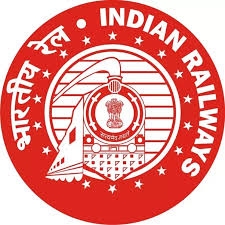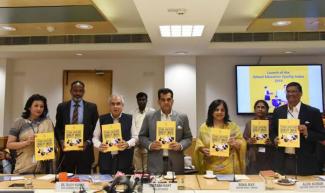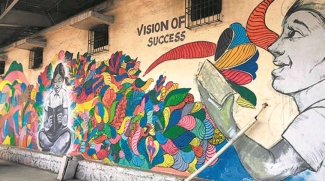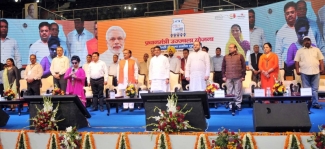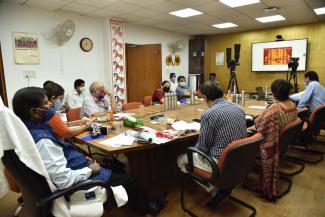
The Government of India, the Government of Jharkhand and the World Bank, signed here today a $147 Million loan agreement to provide basic urban services to the people of Jharkhand and help improve the management capacity of the urban local bodies (ULBs) in the state.
The Jharkhand Municipal Development Project will focus on improving the municipal sector’s capacity to provide basic urban services. It will invest in urban services such as water supply, sewerage, drainage, and urban roads; and strengthen the capacity of the Jharkhand Urban Infrastructure Development Company (JUIDCO) as well as that of the ULBs to carry out reforms in the areas of urban finance and governance.
This is in keeping with the needs of a rapidly urbanizing state where about 31 million people reside in urban areas and urban population growth in nine of 24 districts in Jharkhand is above India’s overall urbanization pace of 2.7 percent.
Speaking on the occasion, Sameer Kumar Khare, Additional Secretary, Department of Economic Affairs, Ministry of Finance, said that the government recognizes that urbanization and economic growth are interlinked and initiated a comprehensive road map for municipal reforms through the AMRUT program. He further said that the Jharkhand Municipal Reform Program will be a definite step forward to strengthen and improve urban services in a fast urbanizing state and will provide an impetus to economic growth.
Shanker Lal, Acting Country Director (India) said that over the past decade, Jharkhand has been focusing on bringing ULBs to the forefront of development and delivery of municipal services. However, there is a huge unfinished reforms and investment agenda for the State. He further said that in this broader context, this project will support the process of strengthening the capacity of urban local bodies while investing in municipal services.
Most of these components will be open to all 43 ULBs in the state who may wish to participate within an agreed framework under the project. Over 350,000 urban residents of the participating ULBs are expected to benefit, of which at least 45 percent will be women.
Interventions such as piped water supply, storm water drains, climate friendly road construction and energy efficient street lighting will not only help improve urban services but also make it environmentally sustainable.
Work on two sub-projects – Khunti water supply sub-project and the Dhanbad roads sub-project is expected to commence shortly. Through its other key components, the project will improve urban governance by assisting ULBs to improve their organizational capacity, manage finances in a sustainable manner, and focus on the development of its nodal implementing agency, JUIDCO.
Vasudha Thawakar, Senior Urban Development Specialist and Task Team Leader for the Project said that Jharkhand needs large-scale investments in urban infrastructure and services. Such investments will require a phased approach. This project will focus on closing the gap on access to basic services and at the same time build the capacity of its institutions to better manage and provide services effectively.
The Loan, from the International Bank for Reconstruction and Development (IBRD), has a 7-year grace period, and a final maturity of 22.5 years.
झारखंड को विश्व बैंक से नगरपालिका विकास परियोजना के कार्यान्वयन के लिए 147 मिलियन डॉलर का ऋण मिलेगा
भारत सरकार, झारखंड सरकार और विश्व बैंक ने झारखंड के लोगों को बुनियादी शहरी सेवाएं मुहैया कराने और राज्य के शहरी स्थानीय निकायों (यूएलबी) की प्रबंधन क्षमता बेहतर करने के लिए आज 147 मिलियन डॉलर के ऋण समझौते पर हस्ताक्षर किए।
झारखंड नगरपालिका विकास परियोजना के तहत बुनियादी शहरी सेवाएं मुहैया कराने के लिए नगरपालिका क्षेत्र (सेक्टर) की क्षमता बेहतर करने पर फोकस किया जाएगा। इसके तहत शहरी वित्त और गवर्नेंस के क्षेत्रों में सुधारों को लागू करने के लिए विभिन्न शहरी सेवाओं जैसे कि जलापूर्ति, सीवरेज, जल निकासी एवं शहर की सड़कों में निवेश किया जाएगा और झारखंड अर्बन इन्फ्रास्ट्रक्चर डेवलपमेंट कंपनी (जेयूआईडीसीओ) के साथ-साथ शहरी स्थानीय निकायों की भी क्षमता मजबूत की जाएगी।
यह तेजी से शहरीकरण की दिशा में अग्रसर इस राज्य की जरूरतों के अनुरूप है, जहां लगभग 31 मिलियन लोग शहरी क्षेत्रों में रहते हैं और झारखंड के 24 जिलों में से 9 जिलों में शहरी आबादी की वृद्धि दर भारत की 2.7 प्रतिशत की समग्र शहरीकरण गति से अधिक है।
वित्त मंत्रालय के आर्थिक मामलों के विभाग में अपर सचिव समीर कुमार खरे ने कहा, ‘भारत सरकार यह बात बखूबी समझती है कि शहरीकरण एवं आर्थिक विकास आपस में जुड़े हुए हैं और इसने अमृत कार्यक्रम के जरिए नगरपालिका संबंधी सुधारों के लिए एक व्यापक खाका (रोडमैप) पेश किया है।’उन्होंने कहा, ‘झारखंड नगरपालिका सुधार कार्यक्रम तेजी से शहरीकरण की दिशा में अग्रसर इस राज्य में शहरी सेवाओं को सुदृढ़ एवं बेहतर करने की दृष्टि से एक निर्णायक कदम साबित होगा और इससे आर्थिक विकास को नई गति मिलेगी।’
कार्यवाहक कंट्री डायरेक्टर (भारत) लाल ने कहा कि पिछले दशक से झारखंड शहरी स्थानीय निकायों को विकास तथा नगरपालिका सेवाएं प्रदान करने के लिए महत्वपूर्ण भूमिका प्रदान कर रहा है। हालांकि राज्य के लिए बड़े पैमाने पर सुधार तथा निवेश पूरे नहीं हो पाए है। उन्होंने कहा कि यह परियोजना शहरी स्थानीय निकायों की क्षमता को मजबूत करने में सहायता प्रदान करेगी। इसके तहत नगरपालिका सेवाओं में निवेश किया जाएगा।
राज्य के सभी 43 यूएलबी के लिए अधिकांश घटक खुले है, जो इस योजना के सहमति फ्रैमवर्क के आधार पर सहभागी बन सकते है। इससे 3,50,000 शहरी निवासियों को को लाभ होगा। इनमें से 45 प्रतिशत महिलाएं होगी।
पाईप के माध्यम से जलापूर्ति, जल निकासी के लिए पम्पों-मशीनों का इस्तेमाल, पर्यावरण अनुकूल सड़क निर्माण और ऊर्जा दक्षता के साथ सड़कों पर रोशनी की व्यवस्था से शहरी सेवाएं बेहतर होगी और यह पर्यावरण के भी अनुकूल होगा।
दो उप योजनाएं- खूंटी जलापूर्ति उप योजना तथा धनबाद सड़क उप योजना का कार्य जल्द ही शुरू होगा। अन्य प्रमुख घटकों के तहत योजना से शहरी प्रशासन बेहतर होगा, क्योंकि शहरी स्थानीय निकायों को अपनी संगठन क्षमता में वृद्धि, वित्तीय प्रबंधन और नोडल एजेंसी जेयूआईडीसीओ के विकास के लिए सहायता दी जाएगी।
वरिष्ठ शहरी विकास विशेषज्ञ और योजना के लिए टास्क टीम की लीडर वसुधा थावाकर ने कहा कि शहरी अवसंरचना और सेवाओं के क्षेत्र में झारखंड को बड़े निवेश की जरूरत है। ऐसे निवेशों के लिए चरणबद्ध दृष्टिकोण अपनाना चाहिए। यह योजना मूलभूत सुविधाओं तक पहुंच और संस्थानों के क्षमता निर्माण के बीच के अंतर को समाप्त करने पर जोर देगी, ताकि सेवाओं को आसानी से उपलब्ध कराया जा सके तथा इनका बेहतर प्रबंधन किया जा सके।






